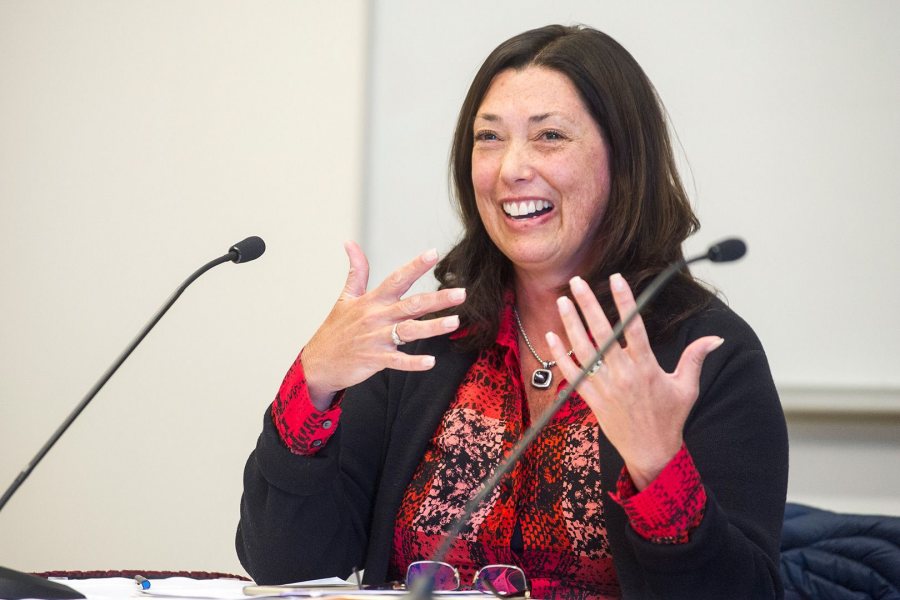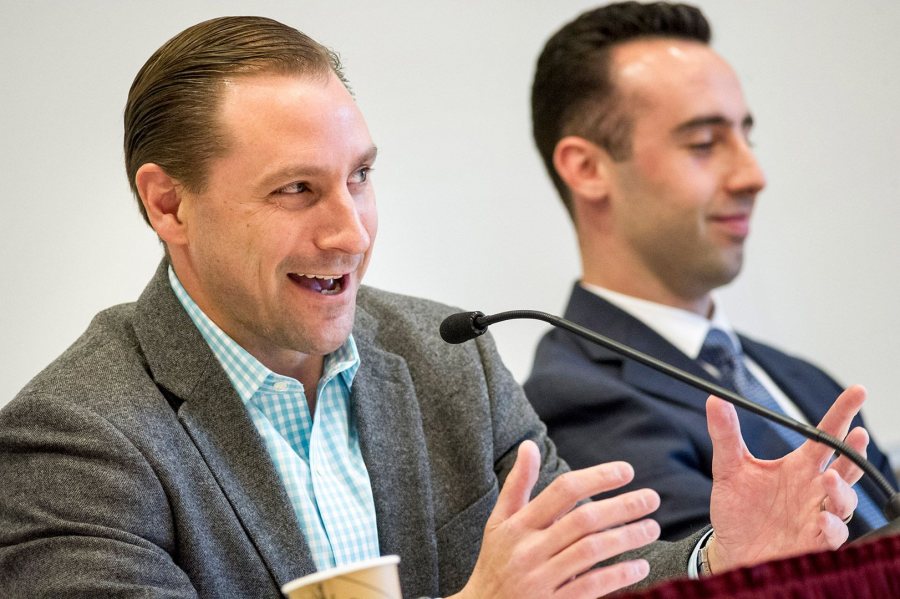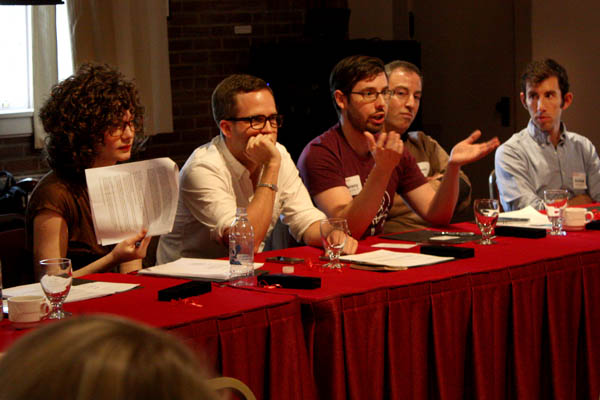
From alumni and other experts, tips and tricks to avoid rookie adult mistakes

(Phyllis Graber Jensen/Bates College)
The job offer not explored. The raise not asked for.
The lease you sign but don’t read. The renter’s insurance that seems like such a good idea — after the burglary. The credit card debt that balloons and carries you away with it.
It’s true: As 20-somethings making our way in the workforce and in the world, most of us leave a trail of rookie mistakes behind us.
But this spring a number of Bates students, including many from the about-to-graduate Class of 2016, were inoculated against some of the most egregious missteps, thanks to the new panel discussion series “How to Adult.”
Another addition to the portfolio of the Purposeful Work initiative, which co-sponsored the series with the Residence Life office, the series came about because Bates students asked for it. They were hungry for guidance on topics ranging from financial management to apartment hunting to finding the right job after college.
Among the presenters were Bates staff and visiting professionals from a variety of industries — and among those visitors were five Bates alumni, part of the growing roster eagerly sharing their know-how during Purposeful Work projects.
The hourlong “How to Adult” sessions yielded a wealth of how-tos and please-don’ts likely to benefit folks of nearly any vintage. So, as a parting gift to the Class of 2016 (and everyone else), here are some highlights from each of the five sessions.
Financing Your 20s: Budgeting and Saving
- Make saving automatic: Create an automatic direct deposit from your paycheck to a savings account. Even a small amount per paycheck will add up.
- Understand what a co-signed loan means. If your parents co-sign for your credit card or your student loans, they are responsible for the repayment if you cannot or do not pay. And never co-sign for anyone else’s loan!
- Get into the habit of budgeting. Knowing your monthly budget will prepare you for salary negotiations and financial strategizing. Find a budgeting tool online or in a self-help book, and reach out to experts, family, and friends for advice.
- Think about what you need, as opposed to want, and save wherever you can. Live below your means. For instance, making your own coffee instead of buying it by the cup can save you $80 a month — the equivalent of a utilities bill.
- Start saving for retirement — right now.

Shown during the “First Jobs” session on March 23, Julie Glauninger ’86 was one of five alumni to participate in the five-part “How to Adult” series. Glauninger is a financial adviser and salary negotiation coach for the city of Boston’s Office of Women’s Advancement. (Josh Kuckens/Bates College)
First Jobs: Salary Negotiation, Decision Making, and What to Do With ‘The Offer’
- As you ponder opportunities, prioritize the industry or the company that interests you and not a specific role or job title. Once you’re in your desired field, you’ll have access to people, professional development, and other opportunities that will help you approach a position you want.
- Understand the workplace culture that suits you and the kind of people you want to work with. When you’re researching a job opening, ask about the company’s culture and what it’s like to actually work there.
- Use the amazing network of Bates alumni, because they are generous with their time. On Bates’ LinkedIn site, you can search the alumni population in many ways.
- If you’re learning to network, an easy place to start is with your friends’ parents. But all of the regular rules apply: Be prepared for the interview, follow up appropriately, and be sure to say “thank you.”
- Overcome hesitation about negotiating a salary and benefits. Know the starting range for the industry. Find language that is conversational, not confrontational, and try to open the topic up. If they want you, they’ll start to show their cards. You can and should ask.
- When you negotiate, silence is your friend. You’ll want to fill the silence — don’t. It’s a golden rule of negotiation.
How to Apartment
- Property management companies may provide the most structured and professional experience for apartment-hunters. Their websites will present price ranges, floor plans, and other helpful information, and companies typically have a choice of properties in a given city.
- Be prepared before you start seeing apartments, because in a competitive market you may have to make a snap decision. Save up for the security deposit and first month’s rent. Have references and a credit report (with your Social Security number redacted) with you.
- In appearance, manner, and communications, be professional dealing with landlords. They’ll want to feel good about having you in their property.
- A one-year lease is ideal and is the standard. Remember that a lease is a contract, and if you break it the landlord can sue for the entire amount due under the lease. If you really must leave before the lease is up, be forthright with the landlord and see what you can negotiate.

Real estate attorney Hawley Strait ’00, at left, shares an insight into the post-college housing hunt as fellow “How to Apartment” panelist Vince Ciampi ’11 of CBRE | The Boulos Company reacts. (Josh Kuckens/Bates College)
Financing Your 20s: How to Use Credit Wisely and Avoid The Debt Debacle
- Shopping for a credit card? Use nerdwallet.com to compare and contrast different cards. And if you can’t get a credit card, check into bank and credit union programs that may help, such as a secured credit card.
- How to establish credit: Get one credit card, buy gasoline with it, and pay it in full every month. Paying off your balance monthly like clockwork builds good credit. Never, never pay late.
- And never pay just the minimum. If you buy something with a credit card, there’s no interest on that charge for about 30 days — it’s a free loan. But if you don’t pay it off in full in that billing cycle, you will start paying interest on the balance.
- Check your credit report annually via annualcreditreport.com. There are three credit-reporting organizations and you can get a free report from each. Make sure they have the facts about you right, and if they don’t, write to them and request a correction. They must correct the record within 30 days.
- Don’t default on your student loan. You can defer it, you can make minimal payments — but once you’re in default, you’re in trouble. Talk to your creditor and get in front of the problem, because you’ll have more options than if you ignore the problem.
- Thinking about graduate school? Look for financial aid, scholarships, and teaching-for-tuition programs. And be absolutely sure you know what you want to do: You don’t want to borrow $20,000 or $30,000 only to discover you’re in the wrong field.
Why Insure?
- Stay on your parents’ healthcare, dental, and car insurance as long as you can. Looking specifically at health insurance, under the Affordable Care Act you can stay on your parents’ plan until age 26.
- Don’t roll the dice and go without health coverage. People with no health insurance now pay a federal tax penalty — $695. More important, healthcare costs are astronomical and you’ll need health insurance to help pay them.
- Your employer may offer benefits that seem irrelevant at your age. But think again about life insurance and short- and long-term disability coverage. They’re all inexpensive, and disability in particular could make the difference between income and no income if you are disabled. (It’s similar for a 401K plan — why not let your employer help pay for your retirement?)
- Many landlords will insist that you have renter’s insurance — and if they don’t, get it anyway, because the landlord’s insurance protects only their property, not yours. Renter’s insurance will cover the theft or destruction of your possessions and temporary housing in case of emergency, and it can cover personal liability. The peace of mind is worth a few hundred bucks a year.
- Myriad factors can affect insurance premiums. For auto insurance, these include gender, age, marital status, how much you drive, your driving record, your academic record, the model of car you drive, and even your credit score. An older married woman with a clean record will pay lower premiums than a young single male with speeding tickets.
- Establish relationships with a dentist and a primary care physician — it’s one of the most important healthy behaviors. It’s important to have regular checkups and practitioners who know your history. And in the case of the primary care doctor, an annual checkup is 100 percent paid for by health insurance.
Panelists
Financing Your 20s: Budgeting and Saving (March 16)
George Carr ’07, portfolio manager, RM Davis, Portland, Maine
Nathaniel Hull, Credit Abuse Resistance Education Program, Portland, Maine
Kelsey Gillespie, community marketing coordinator, Casco Federal Credit Union, Gorham, Maine
First Jobs: Salary Negotiation, Decision Making, and What to Do With ‘The Offer’ (March 23)
Julie Glauninger ’86, financial adviser and salary negotiation coach for the city of Boston’s Office of Women’s Advancement
Colleen Coxe, senior associate director of employer and alumni relations, Bates Career Development Center
Genevieve Leslie, director of annual giving, Bates Office of College Advancement
How to Apartment (May 4)
Vince Ciampi ’12, associate, CBRE | The Boulos Company
Hawley Strait ’00, real estate attorney, Bernstein Shur Law Firm, Portland, Maine
Financing Your 20s: How to Use Credit Wisely and Avoid The Debt Debacle (May 11)
Rich Goldman ’76, P’16, bankruptcy attorney, Augusta, Maine
Randy Creswell, director and shareholder, Perkins | Thompson, Attorneys and Counselors at Law
Why Insure? (May 18)
Dottie Chalmers-Cutter, vice president of operations, Chalmers Insurance Group, Bridgton, Maine
Ken Emerson, senior director of operations and benefits, Bates Human Resources
Dean DeMario, life and health benefits agent, Chalmers Insurance Group
Rebecca Fraser-Thill, lecturer in psychology and director of program design for Purposeful Work, moderated all but the March 23 event, which was moderated by Erin Foster Zsiga, associate dean of students for residence life and health education
Leanne Ouimet of the Bates Communications Office contributed to this report.



